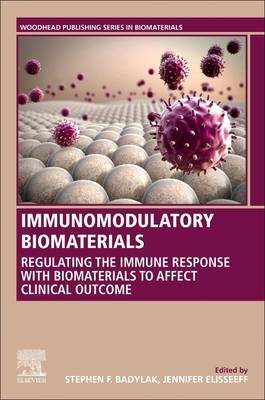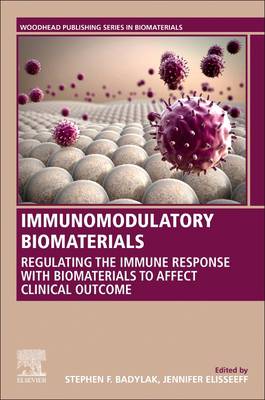
- Retrait gratuit dans votre magasin Club
- 7.000.000 titres dans notre catalogue
- Payer en toute sécurité
- Toujours un magasin près de chez vous
- Retrait gratuit dans votre magasin Club
- 7.000.0000 titres dans notre catalogue
- Payer en toute sécurité
- Toujours un magasin près de chez vous
Immunomodulatory Biomaterials
Regulating the Immune Response with Biomaterials to Affect Clinical Outcome
Description
Biomaterials have existed for millennia as mechanical replacement structures following disease or injury. Biomaterial design has changed markedly from structural support with an "inert" immune profile as the primary objective to designs that elicit an integrative local tissue response and a pro-repair immune cell phenotype.
Immunomodulatory Biomaterials: Regulating the Immune Response with Biomaterials to Affect Clinical Outcome offers a single, comprehensive reference on biomaterials for modulation of the host response, for materials scientists, tissue engineers and those working in regenerative medicine. This book details methods, materials and strategies designed to regulate the host immune response following surgical implantation and thus facilitate specific local cell infiltration and tissue deposition.
There has been a dramatic transformation in our understanding of the role of the immune system, both innate and adaptive; these changes include recognition of the plasticity of immune cells, especially macrophages, cross-talk between the immune system and stem cells, and the necessity for in situ transition between inflammatory and regulatory immune cell phenotypes. The exploitation of these findings and the design and manufacture of new biomaterials is occurring at an astounding pace. There is currently no book directed at the interdisciplinary principles guiding the design, manufacture, testing, and clinical translation of biomaterials that proactively regulate the host tissue immune response.
The challenge for academia, industry, and regulatory agencies to encourage innovation while assuring safety and maximizing efficacy has never been greater. Given the highly interdisciplinary requirements for the design, manufacture and use of immunomodulatory biomaterials, this book will prove a useful single resource across disciplines.
Spécifications
Parties prenantes
- Editeur:
Contenu
- Nombre de pages :
- 294
- Langue:
- Anglais
- Collection :
Caractéristiques
- EAN:
- 9780128214404
- Date de parution :
- 30-07-21
- Format:
- Livre broché
- Format numérique:
- Trade paperback (VS)
- Dimensions :
- 152 mm x 229 mm
- Poids :
- 394 g

Les avis
Nous publions uniquement les avis qui respectent les conditions requises. Consultez nos conditions pour les avis.





